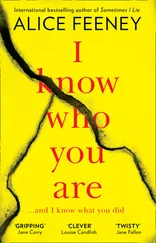In some ways it was a relief to realize that Jenny’s parents didn’t always get along—it made my own family seem less screwed up—but it was also disturbing. It was like seeing a famous actress without makeup.
* * *
THE NEXT MORNING we rushed to pack up the car because Mr. Jones was worried we’d miss our ferry. The front doors were open so that he could stand on the running board to reach the roof. While her father strapped our bags onto the rack, Jenny lingered beside the open door, studying her reflection in the side mirror. “I think I have some new freckles,” she said. “Just from this week.” She did have new freckles. Four on her forehead, three on her nose. She also had a narrow stripe of sunburn down one leg, where the sunscreen had missed a spot.
“Come on, girls, get in the goddamn car,” Mr. Jones snapped. It was the first time I’d witnessed his temper, and the flare-up scared me. His jaw locked, and he pushed his glasses up on his forehead to reveal an unforgiving squint. It was a glimpse of a man I didn’t know. My nerves were still wobbly as I buckled myself into my seat.
We made the boat back to the mainland, but somewhere in the middle of Connecticut my suitcase fell off the roof. We heard the thump, and by the time Mr. Jones yanked the car to the shoulder, the contents of the bag had already scattered across the highway. My days-of-the-week underpants made a rumpled calendar in the far lane until a tractor-trailer ran them over.
“Ed,” Mrs. Jones scolded, “you didn’t tie them down tight enough.”
“Get off my fucking back.”
“You said the F-word, Daddy,” said Jenny.
“And I’ll fucking say it again,” he said. Jenny, chastised, slid down in her seat.
Mr. Jones set up emergency flares, and as passing cars slowed to rubberneck, he darted out into the lanes to retrieve a handful of items.
“Oh, honey, I don’t think anything survived,” Mrs. Jones said sadly, as if I’d lost family members instead of articles of clothing. I could feel tears trembling on my lashes; I didn’t care about the clothes, but I was tired of being the one to whom the bad things happened. No one else’s suitcase fell off the roof. It wasn’t fair.
We left the shredded garments on the pavement. The suitcase itself—it was black-and-white houndstooth and belonged to my mother—had come to rest near the guardrail. It survived the fall without damage but was smeared with axle grease. Mr. Jones secured the empty bag on the roof with extra bungee cords. For the rest of the long ride home, the only sound I remember is the unsettling tickle of the hermit crab moving around his cage.
Back in Washington that evening, Jenny decided that the crab deserved freedom. She released him from his cage and let him crawl around on the kitchen floor. “Just for a few minutes,” she promised her mom. But hermit crabs move fast: we soon lost sight of him. Before we could figure out where he’d scampered off to, we heard Mr. Jones shout, “Goddammit.” Jenny and I rushed to the front hall and found a cracked shell, a violent smear. The crab had met his end under Mr. Jones’s shoe.
“My crab!” Jenny wailed. I realize now that it was the worst thing that had ever happened to her.
“Daddy didn’t mean to,” said Mrs. Jones.
“There’s a moral here,” said Mr. Jones.
But I can’t remember what the moral was.
* * *
JENNY AND I BEGAN to drift away from each other that fall. She continued to smile benevolently at me in the halls, even after she fell in with Kim’s crowd—her newfound celebrity made her an asset to the clique—and if she sensed any hostility or awkwardness from me, I’m sure it was attributed to envy. I still spent some afternoons at her house, but while I was there, she was usually on the phone. She had inspired a cult of personality. She twisted the telephone cord around her finger like a lock of hair. “We need to get another line,” her mom said. “What if it’s urgent and someone has to get through?”
Jenny and I used to joke that we needed a direct hotline to each other’s house, like the red phone between Washington and Moscow. But now she was busy talking to other people. By second semester it was Kim who was going to the Joneses’ house after school; from my bedroom I watched her saunter up the twenty-one steps to their front porch. Was Jenny telling Kim all the things I’d said about her? “I just don’t think she’s that smart,” I’d said once. And “She’s so fake.” I’d confided in Jenny about so many things, and now I worried that my information was no longer safe. Were they laughing at me or, worse, feeling sorry for me? Kim just likes you because you’re famous, I wanted to say. You’re just another cool brand.
Jenny quit swimming and joined Kim’s soccer team. “Isn’t it boring going back and forth alone in a pool?” Kim said. “At least in soccer you get to talk to people on the field. It’s a team sport.”
In the cafeteria Kim led Jenny around like a trophy. And on the days when Jenny was out of school, she took charge of informing all the teachers of her whereabouts. At the start of every class, she raised her hand to announce her famous friend’s schedule: “I just wanted to let you know that Jenny is in L.A. until Friday. I talked to her last night.”
Social dynamics often shift in sixth grade. We weren’t the only friends who grew apart that year. But I wasn’t just losing a friend; I felt as if my whole life was unmoored. That fall my father called to tell me that Phillipa was pregnant. My half sibling was expected in January. “We hope you’ll meet the baby,” he said, but I knew that wasn’t likely. I’d never even met Phillipa. At school I learned to catch the sorrow in my throat and then stick my head into my locker and let the tears slide down my cheeks without making any vibration at all.
I didn’t tell my mother about finding my letter in Jenny’s room. Of course she noticed that Jenny hadn’t been around in a while, but she ascribed the absence to Jenny’s relentless publicity schedule, and I didn’t disabuse her of that notion. I needed an ally, but I wasn’t sure my mother could be one. She was so fixated on disarmament that everything about Jenny’s fame—and the attention it brought to the cause—thrilled her.
Jenny became a touchstone for nuclear anxiety. When The Day After premiered on ABC that November, various newspapers asked for her comment. “Are you going to watch the movie?” they asked. A stupid question, since we were all going to watch the movie. Our teachers had instructed us to watch it, with our parents. For most kids the depiction of mutually assured destruction was traumatizing, but for me the film just confirmed everything my mother had told me. Once launched, ICBMs could not be recalled. It would take just thirty minutes for those missiles to reach us. Enough time to retaliate, but not much else.
We were all doomed.
* * *
I WAS IN SEVENTH GRADE when the head of the middle school pulled me out of class to give me the news. It was January 1985. Jenny and I had hardly spoken in a year.
“There’s been an accident,” she said. She touched my shoulder, then thought better of it and extracted her hand. She wore a beige cardigan, the antiseptic color of a dentist’s office. We were in the library; there was a blur of red encyclopedias behind her. My stomach growled. It was almost time for lunch. “An accident?” I said.
“Your friend Jennifer’s plane.”
I was allowed to leave school early that day. At home I found my mother in her bathroom. She was stretched out in the empty claw-foot tub, fully dressed, as if indulging in a good soak. She didn’t even look at me as I entered the room.
Читать дальше












